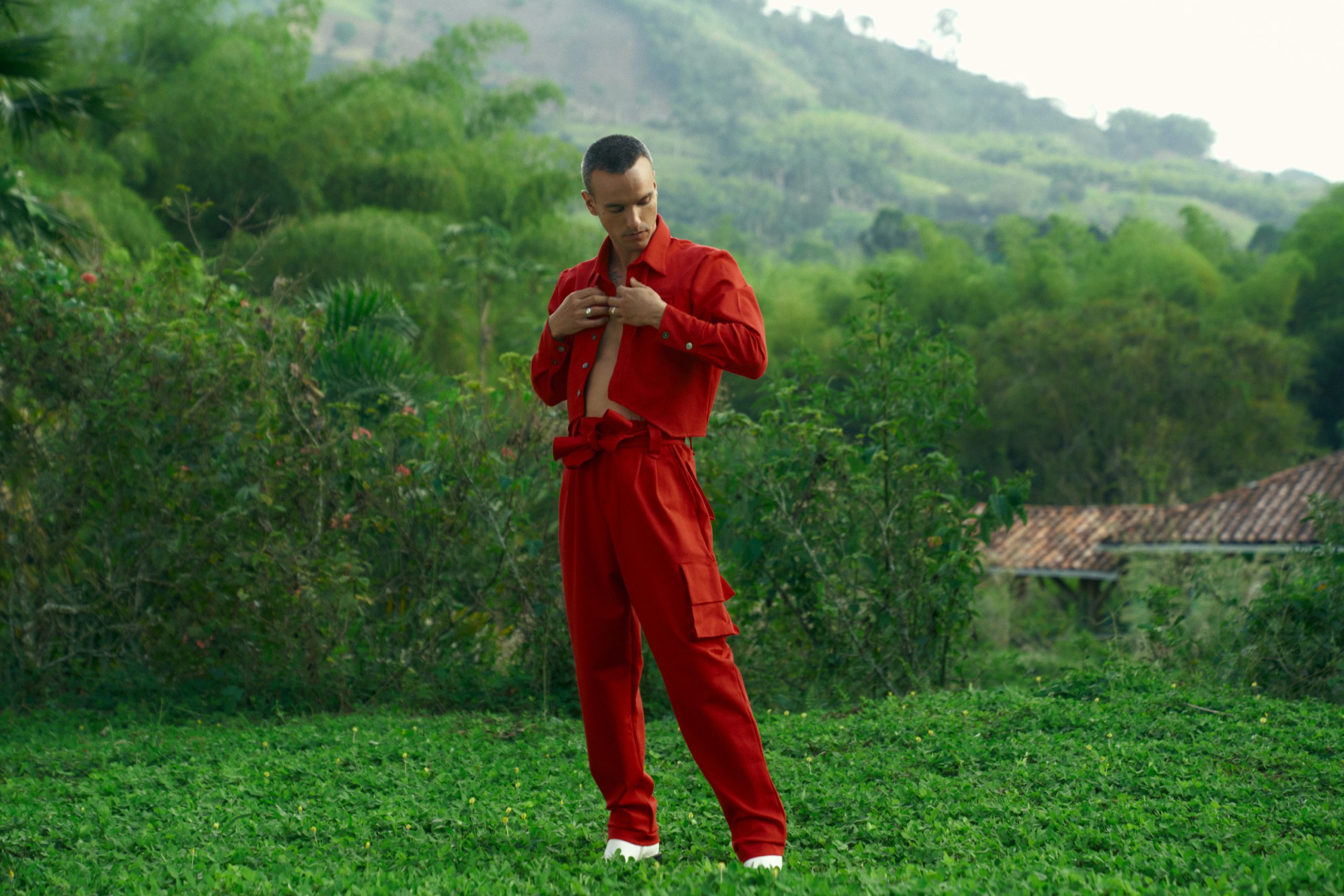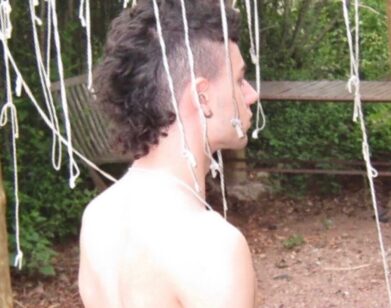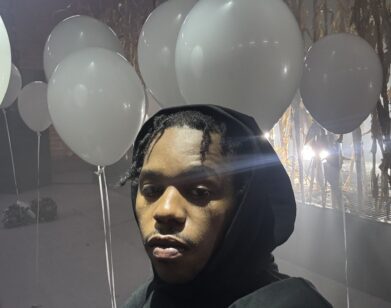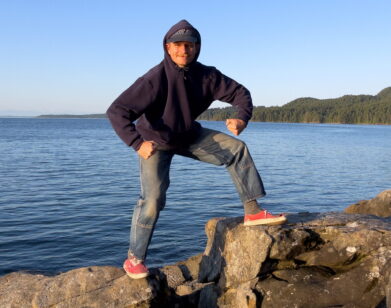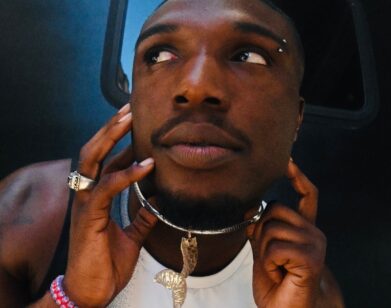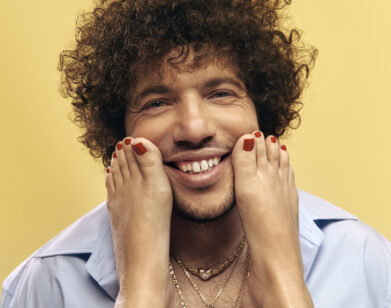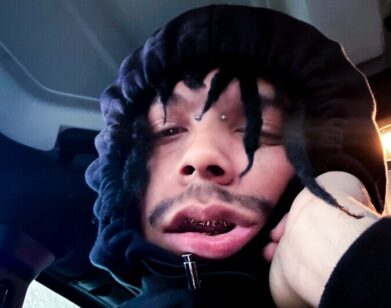nice to meet you
For “Agüita” Singer Gabriel Garzón-Montano, It Starts With the Pelvis
This is “Nice to Meet You,” for all your need-to-know information on the need-to-get-to-know new voices in pop culture. Think of it as a blind date, if the date were cooler than anyone you’ll probably ever go out with. Allow us to break the ice; we promise you’ll fall in love.
The Brooklyn-bred singer Gabriel Garzón-Montano has never fit the mold. His third album, Agüita, explores his multi-faceted individualism, from his bi-cultural upbringing (his parents are French and Colombian) to bending genres and playing with gender through fashion. As he explained to me over the phone, Agüita is not only a departure, but also a way to flex his papi chulo muscles for those non-believers, and ultimately, for himself. GGM has discovered in his own journey like most first-generation Americans do (myself included), that in order to build a more inclusive future, where the exploration of identity and all that it entails is encouraged and celebrated, not concealed and dissected, the work has to start from within, before it can have an outward effect. A few days after getting back home to Brooklyn and in between vacuuming his apartment, GGM spoke with Interview about the inspiration behind some of his songs like “Agüita” and “Muñeca,” his adoration for Prince as “the funkiest motherfucker,” and why is pelvis is the source of his power.
———
On growing up with artist parents in New York: My mother was a mezzo-soprano. She played piano, guitar, cello, and percussion. She shared music with me since I was in the womb, and it was a fixture in my life since I can remember. When I was six, she took me to the Third Street Music School on 11th Street in Manhattan. She said, “Let’s take a walk and pick an instrument. You point to it.” I saw three girls sitting on the floor, plucking their violins with their thumbs and I liked that stance. I just liked the way they looked, badass. The musical side of things is from my mother. My father is a cartoonist. He always shared with me a lot of introspection. Both of my parents are artists, so I think that really set the tone for me.
On making pelvic, funky music: It’s all very bent on creating an experience of beauty and wonder, and it all really needs to be funky and come from the pelvis. I really love the tension between the pelvis and Western intellect, which is what my cultural identity has been, through navigating being an American kid, which is this flatlining of all the expectations of your daintiness and of your wonderful energies. Basically celebrating multiplicity, the many folds of a human, and the ways in which all these little different-colored sands fold into all of our little wrinkles.
On his album Agüita: The name comes from the old-school notion of naming the record with the title track being the focus single. It was me remembering that the Beatles had I Want to Hold Your Hand, Please, Please Me, and Help. I just feel the creation of that song was such a pivotal moment for my vision of what this album could be and how I could contextualize different aspects of myself in my presentation.
On the song “Agüita”: It’s the song that changed my idea of how I could present as an artist and that I could put a radio joint, next to my most tender, personal reflection, and expression.
On actual celestial patterns, Not Co-Star: I see a lot of coinciding insight when I examine my thought life and experience. People talk to me about what they see in the archetype that they can trace through the celestial patterns of my movement through space and time. So it’s pretty dope. I don’t know about all that Co-Star stuff, but that shit tends to spook me because it’s so right on.
On wanting a more fluid and sophisticated culture: We think we’re not enough, all the time. And that’s not cute. We’re just so dope, and we’re put into these structures that don’t permit us to express that, and it’s demeaning. We assume that nobody else is there with us when we’re all together. We have to make this culture way more fluid and sophisticated. That’s what this is about.
On reggeaton and Daddy Yankee: I love the way reggeaton makes me feel and the way I can access a feeling I get from salsa and dancehall, which is really my reference. When I’m singing “Muneca,” if you changed it to English and changed it to a different singer, you would really see the tendencies from dancehall. At the same time, when you listen to the first records from Daddy Yankee, he’s like the Three 6 Mafia of reggaeton, because he was doing trap music in the early ’90s.
On his playful approach to social media: If you take yourself too seriously on it, you’re going to fail. I think my relationship is increasingly in that space of play and joy. If it’s not there, I’m not doing it. Because of the idea that your private would be public, it does fuck with your head. Everyone is noticing how behaviors change and how people modify their actual dreams and desires in micro ways to adapt to that need. That’s interesting to me.
On Prince: Prince is a moment where somebody radically decides how they’re going to interact with the world with their own spirituality, through identifying a need and then just relentlessly exploring the possibilities. He’s the funkiest motherfucker out there. The lyrics, the songwriting, the recording techniques, the clothing, everything he did is on another wavelength.
On what’s next: I have other music. I did a video two days ago for a song with Andrekza that we’re really excited about, shot it in Chinatown. I have a collaboration with Esteban Cortazar, who’s an amazing designer from Colombia who lives in Paris, and some suits with D.N.I., who are two brothers from Peru who live in Paris, just to get my clothing back into focus a little bit.


